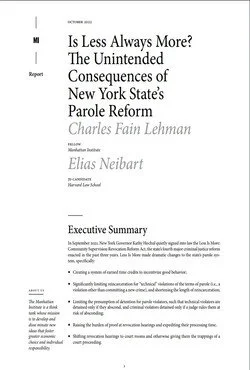By Elias Neibart
In September 2021, New York Governor Kathy Hochul quietly signed into law the Less Is More: Community Supervision Revocation Reform Act, the state’s fourth major criminal justice reform enacted in the past three years. Less Is More made dramatic changes to the state’s parole system, specifically: Creating a system of earned time credits to incentivize good behavior;Significantly limiting reincarceration for “technical” violations of the terms of parole (i.e., a violation other than committing a new crime), and shortening the length of reincarceration;Limiting the presumption of detention for parole violators, such that technical violators are detained only if they abscond, and criminal violators detained only if a judge rules them at risk of absconding;Raising the burden of proof at revocation hearings and expediting their processing time;Shifting revocation hearings to court rooms and otherwise giving them the trappings of a court proceeding. These changes, supporters argued, were necessary to minimize the unnecessary and counterproductive reincarceration of petty technical violators—the parolee who is on the straight and narrow but who nonetheless finds himself back in prison due to a minor slip-up. In making these changes, however, they also made it harder to detain many serious offenders, including serious criminal violators; evidence from NYC jails show that detention of even violent criminal violators fell in the wake of Less Is More. In addition, it created a greater burden on victThis, we argue, is due to the broad-reaching procedural changes enacted by Less Is More. The lost presumption of detention, heightened evidentiary standards, and constraints placed on the use of technical violations—all of which apply not only to petty technical violators but to more dangerous parolees—have defanged the supervision system. While reforms that reward good behavior and do not over-punish minor violations are desirable, we propose a series of changes to blunt the unintended effects on the more serious offender population. Specifically, we suggest several reforms of the reformims, who are often now involved in revocation hearings in addition to new criminal proceedings.
New York: Manhattan Institute, 2022. 28p.





